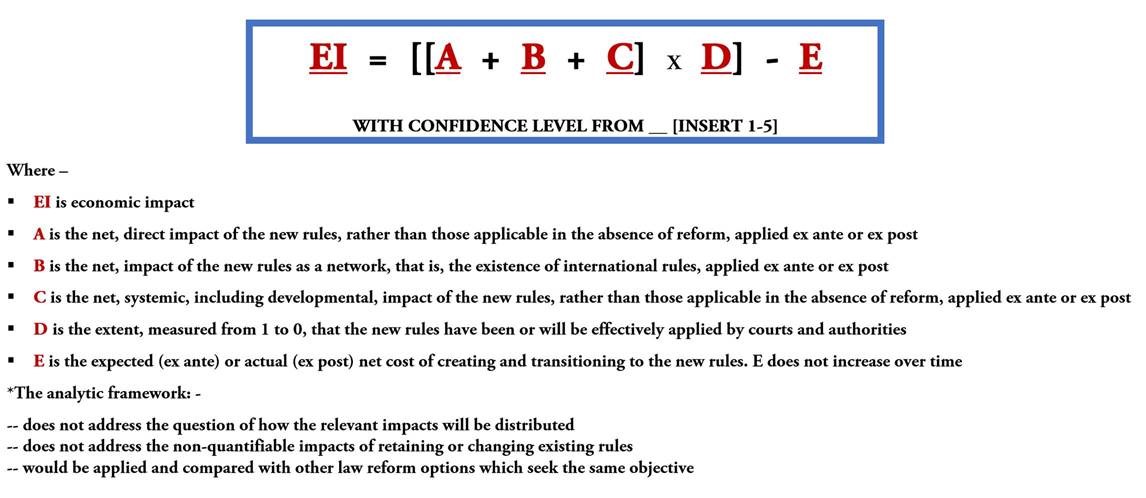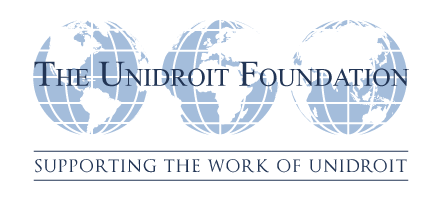Economic Assessment of International Commercial Law Reform
This project seeks to develop standards for the economic assessment of international commercial law reform (ICLR).
Economic benefits, whether micro, macro, or developmental, are usually stated to be the central and driving objective of, and justification for ICLR. Yet the evidence of such benefits, the characteristics of law reform needed to produce such benefits, the data and methodology to establish such benefits (the core EA elements), inter alia, has not yet been subject to systematic academic work. There are few, if any, agreed international principles, standards, or parameters for assessing economic benefits in this context.
This project provides a platform for work in this and seeks to create principles, standards, and parameters, including the development of guidelines for governmental economic impact and cost-benefit analyses of ICLR. It is an inter-disciplinary project with involvement from industry, national governments, international organisations, legal scholars and economists. It is run by the Cape Town Convention Academic Project, in partnership with the UNIDROIT Foundation, and the Aviation Working Group.
The project has three main objectives:
i. To research, collect, and assess information relating to the production of economic benefits of ICLR, centered on the core EA elements.
ii. To develop guidelines for governmental economic impact and cost-benefit analyses of ICLR.
iii. To produce a framework document on the economic assessment of ICLR, which would be a resource for those involved in the creation or implementation of an ICLR instrument.
This is an inter-disciplinary project with involvement from industry, national governments, international organisations, legal scholars and economists.
Workshops
Workshops for the project have previously been held at the University of Oxford and UNIDROIT. Executive summaries for these can be accessed from the column on the right. Over the course of these workshops, progress has been made towards the development of a comprehensive framework to conduct economic assessments of ICLR projects. A large gap was identified between theory and practice in this area, as rigorous economic analysis processes are not consistently used in regulatory decision making. At the end of the fifth workshop, the below framework was produced:

The 6th workshop of the Economic Assessment of International Commercial Law Reform Project was held on 8 September at the UNIDROIT Headquarters in Rome.
Due to the COVID-19 pandemic the meeting was held in hybrid format, with 10 participants present at the Institute, 25 remote participants and over 30 remote observers. Building on the outcomes of the 5th workshop in April 2019, the 6th workshop further explored the relationship between the framework’s variables and how the framework is to be applied during different phases of a commercial law reform project. Participating experts also discussed the content of the practical guide being developed alongside the framework.
Following a restricted 7th session in March 2022, the 8th workshop for this Project took place on 15 September 2022, in Cambridge and online. The workshop was attended by 20 experts with diverse backgrounds and benefited from presentations on ex-ante regulatory assessments given by representatives of the OECD and the European Commission. After these presentations, the discussion moved to specific aspects of the Framework for the assessment of economic impacts of international commercial law reforms, with introductory remarks by Professor Oren Sussman (University of Oxford). Aspects considered by the project group included the scoring system for the variables, distributional effects, social and environmental impact, and the confidence level of economic impact assessments. In addition, the group discussed a case study on a hypothetical ex-ante economic assessment concerning a possible Maritime Protocol to the Cape Town Convention.
The 9th workshop for this project took place on 14 and 15 February 2024 at the seat of UNIDROIT in Rome and online, with the participation of 12 participants with legal and economic backgrounds. Building on the outcomes of the 8th Workshop, the 9th workshop focused on further developing guidance to accompany the Framework. The workshop addressed issues and challenges in the practical application of the Framework and the Guide, particularly from an economist’s perspective. It included a comparison of an ex post economic analysis of the Cape Town Convention and the Aircraft Protocol with the approach and concepts in the EA ICLR project.
Resources:
Executive Summary – First Workshop
Executive Summary – Second Workshop
Executive Summary – Third Workshop
Executive Summary – Fourth Workshop
Executive Summary – Fifth Workshop
Executive Summary – Sixth Workshop
Economic Assessment of Transnational Commercial Law Reform – Professor Jeffrey Wool
Presentation – The economic assessment of international commercial law reform: overview – Jennifer Varzaly
Documents from 5th Workshop
5th Workshop Discussion Paper 1 – Relationship Between the Framework’s Variables
5th Workshop Discussion Paper 2 – Use of the Framework Over Time
Documents from the 6th Workshop
Hamza Hameed – Introduction to the Project
Jonathan Lipson – Variable D of the Framework
Juan Mora Sanguinetti – Comments on Jonathan Lipson’s Presentation
Proposed Structure for the Draft Guide to the Economic Assessment Framework
Report of the 8th Workshop
Upcoming Event:
For information on how to participate in this project, please contact us.
